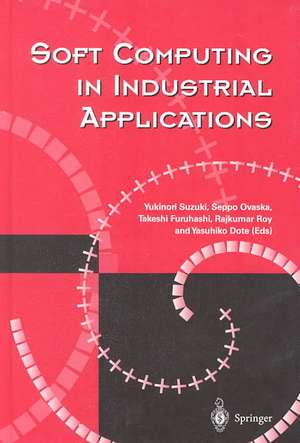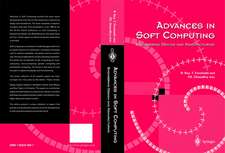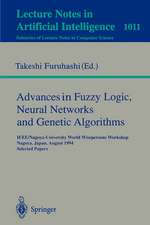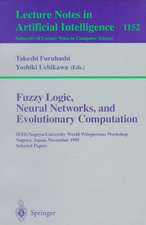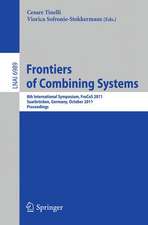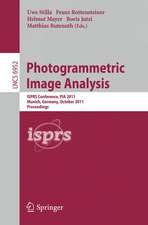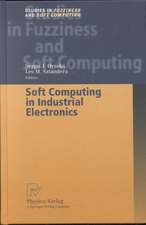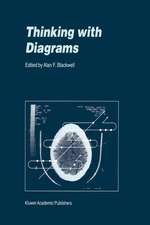Soft Computing in Industrial Applications
Editat de Yukinori Suzuki, Seppo J. Ovaska, Takeshi Furuhashi, Rajkumar Roy, Yasuhiko Doteen Limba Engleză Hardback – 15 mar 2000
Preț: 1297.85 lei
Preț vechi: 1622.31 lei
-20% Nou
Puncte Express: 1947
Preț estimativ în valută:
248.34€ • 259.99$ • 205.49£
248.34€ • 259.99$ • 205.49£
Carte tipărită la comandă
Livrare economică 05-19 aprilie
Preluare comenzi: 021 569.72.76
Specificații
ISBN-13: 9781852332938
ISBN-10: 185233293X
Pagini: 692
Ilustrații: XV, 670 p.
Dimensiuni: 155 x 235 x 46 mm
Greutate: 1.14 kg
Ediția:2000
Editura: SPRINGER LONDON
Colecția Springer
Locul publicării:London, United Kingdom
ISBN-10: 185233293X
Pagini: 692
Ilustrații: XV, 670 p.
Dimensiuni: 155 x 235 x 46 mm
Greutate: 1.14 kg
Ediția:2000
Editura: SPRINGER LONDON
Colecția Springer
Locul publicării:London, United Kingdom
Public țintă
Professional/practitionerCuprins
1: Fuzzy Computing.- Fuzzy Process Model Development with Missing Data.- Decomposed Fuzzy Models for Modelling and Identification of Dynamic Systems.- Investigation of Least Square Fuzzy Identification via a Virtual Higher Resolution Fuzzy Model.- Fuzzy Morphologies Revisited.- A Design Method of Stable Non-separate Controller Using Symbolic Expressions.- Adjustment of Identified Fuzzy Measures.- Design and Application of Block-Oriented Fuzzy Models — Fuzzy Hammerstein Model.- Evolving Fuzzy Detectives: An Investigation into the Evolution of Fuzzy Rules.- Fuzzy Logic Two-phase Traffic Signal Control for Coordinated One-way Streets.- Clustering Models Extracting Dynamic and Non-Dynamic Changes for 3-Way Data.- 2: Neuro Computing.- Identification of Nonlinear Multivariable Process by Neural Networks: Open-loop and Closed-Loop Case Studies.- Modelling Batch Learning of Restricted Sets of Examples.- Neural Networks with Hierarchically Structured Information and its Unlearning Effects.- Discussion of Reliability Criterion for US Dollar Classification by LVQ.- Facility Location Using Neural Networks.- Building Maps of Workspace for Autonomous Mobile Robots Using Self-Organizing Neural Network.- Neural Network Parameter Estimation and Dimensionality Reduction in Power System Voltage Stability Assessment.- Neural Networks-based Friction Compensation with Application in Servo Motor Systems.- Linear and Neural Dynamical Models for Energy Flows Prediction in Facility Systems.- An Optimal VQ Codebook Design Using the Co-adaptation of Learning and Evolution.- 3: Evolutionary Computation.- An Emergence of Coordinated Communication in Populations of Agents with Evolution Simulated by Genetic Algorithm.- Migration and Population Dynamics in Distributed Coevolutionary Algorithm.-Royal Road Encodings and Schema Propagation in Selective Crossover.- An Evolutionary Approach for the Design of Natural Language Parser.- GA-Based Identification of Unknown Structured Mechatronics System.- Integrating Genetic Algorithms and Interactive Simulations for Airbase Logistics Planning.- Evaluation of Virtual Cities Generated by Using a Genetic Algorithm.- 4: Probabilistic Computing.- Minimizing Real Functions by Scout.- Qualitative Similarity.- Survival Probability for Uniform Model on Binary Tree: Critical Behavior and Scaling.- Stochastic Modelling of Multifractal Exchange Rates.- Bayesian State Space Modeling for Nonlinear Nonstationary Time Series.- Noise Induced Congestion in Coupled Map Optimal Velocity Model of Traffic Flow.- Geometrical View on Mean-Field Approximation for Solving Optimization Problems.- Probabilistic Computational Method in Image Restoration Based on Statistical-Mechanical Technique.- Bayesian Neural Networks: Case Studies in Industrial Applications.- 5: Hybrid Methods, Chaos, and Immune Networks.- Multivariable Predictive Control Based on Neural Network Model and Simplex-Evolutionary Hybrid Optimization.- Permeability Prediction in Petroleum Reservoir using a Hybrid System.- A Performance Comparison of Chaotic Simulated Annealing Models for Solving the N-Queen Problem.- Study on the Idiotypic Network Model for the Feature Extraction of Patterns.- 6: Rough Sets.- Rough Set Based Uncertainty Management for Spatial Databases and Geographical Information Systems.- Soft Computing for Evolutionary Information Systems — Potentials of Rough Sets.- Towards Rough Set Based Concept Modeler.- 7: Image Processing.- Still Images Compression Using Fractal Approximation, Wavelet Transform and Vector Quantization.- N-dimensional Frameworks for theApplication of Soft Computing to Image Processing.- Computational Autopoiesis for Texture Analysis.- Novel Approach in Watermarking of Digital Image.- A Fuzzy Region-Growing Algorithm for Segmentation of Natural Images.- 8: Human Interfaces.- Design Issue of Electric Agent for Realizing Biological and Social Coordination with Human and Environment.- An Emergent Approach for System Designs.- Training of Fuzzy Rules in the Freehand Curve Identifier FSCI.- Intelligent Real-Time Control of Moulding Mixtures Composition in Foundries.- 9: New Frontiers of Soft Computing.- Test Feature Classifiers and a 100 % Recognition Rate.- Evaluation of the Modified Parzen Classifier in Small Training Sample Size Situations.- Soft Limiting in Adaptive Notch Filtering.- An Algorithm for Induction of Possibilistic Set-Valued Rules by Finding Prime Disjunctions.- Dataflow Realizes a Diagrammatic Programming Method.- DIFFOBJ — A Game for Exercising Teams of Agents.- Author Index.
Caracteristici
Contributions from worldwide leading researchers in the field Especially innovative chapters on Fuzzy computing, Neuro computing and Evolutionary computing
